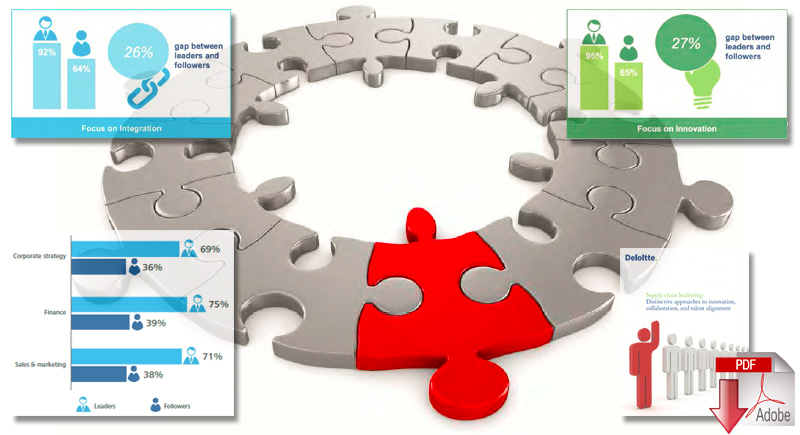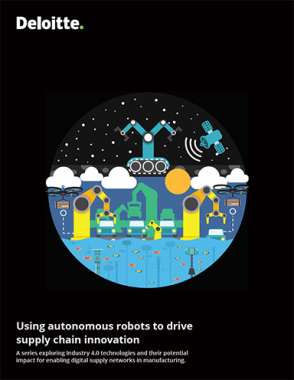Advanced Supply Chain Capabilities Are a Crucial Catalyst for Strong Financial Performance
According to a new study from Deloitte, organizations with superior supply chain capabilities achieve significantly higher levels of performance on both revenue growth and EBIT measures when compared to the industry average.
The Deloitte study, Supply chain leadership - Distinctive approaches to innovation, collaboration, and talent alignment, reveals that 79 percent of organizations with superior supply chain capabilities (”supply chain leaders”) report revenue growth that is considerably above the industry average.
Conversely, only eight percent of the organizations with lower supply chain performance report significantly above-average revenue growth. Furthermore, 69 percent of supply chain leaders have an EBIT margin that is well above the industry average compared to only nine percent of supply chain followers.
“At a fundamental level, manufacturing organizations compete on their supply chain capabilities,” said Kelly Marchese, principal, Deloitte Consulting LLP and a leader in Deloitte’s supply chain practice.
“At the same time, supply chains are increasingly complex, as linear trade flows evolve into intricate webs of global operations and third-party collaboration. It’s an incredibly challenging time to be a supply chain executive and in this demanding environment it’s useful to learn from the organizations that are excelling.”
The survey was conducted among 421 executives in more than ten countries. Organizations were designated as “supply chain leaders” if they were rated by their executives as significantly above-average compared to their industry on two metrics: inventory turnover and the percentage of deliveries on-time and in full.
Supply chain leaders embrace innovation
The ability to innovate was identified by the survey as a key factor separating the supply chain leaders from followers. Among the survey findings, supply chain leaders:
- Recognize the importance of innovation and put it at the top of their agenda, with 96 percent of leaders identifying innovation as “extremely important” to growth (vs. 65 percent of supply chain followers).
- Are early adopters of disruptive technologies such as 3D-Printing, with 48 percent of leaders using 3D-Printing “extensively” (vs. 13 percent of supply chain followers).
- Use analytics extensively, with 75 percent of leaders utilizing optimization software (vs. 34 percent of supply chain followers). Leaders are also more than twice as likely to use visualization software (67 percent vs. 28 percent), mobile technologies (75 percent vs. 30 percent) and radio frequency identification tags (65 percent vs. 27 percent).
Marchese continued, “The ability to effectively innovate has emerged as a key attribute of successful supply chains. It’s crucial for leaders to keep a close eye on emerging technologies and have a bold strategy for weaving these into their operations.
Furthermore, while many innovation efforts focus on new products, those innovations tend to be the easiest to imitate, so business model innovations focused on improving networks, processes, services or channels can have a much greater and more sustainable impact.
Many executives are daunted by innovation or feel that it’s an overhyped buzzword. It’s true that many innovation efforts do fail, but the good news is that there are specific systems and disciplines that, when applied effectively, can greatly improve innovation success rates.”
Leadership, collaboration and effective talent strategies are also crucial competitive advantages
The study revealed several other qualities that separate supply chain leaders from followers. Among the qualities:
- Empowering executive level leadership: Fifty-six percent of supply chain leaders have a senior executive heading their supply chain function, compared to just one–third (33 percent) of supply chain followers. Having a “seat at the table” to offer insights on the supply chain aspect of business decisions allows for better alignment between supply chain management and business strategies.
- Connecting the organization: Of the six “links” frequently associated with supply chain management – product development, demand planning, supply planning, sourcing and procurement, manufacturing, and logistics and distribution – roughly half of leaders owned all six. By comparison, a majority of supply chain followers controlled only three areas or fewer.
- Developing talent strategies for a new era of supply chain professionals: Supply chain leaders seem to recognize that today’s supply chain organizations need a broader set of skills and experiences than they did in the past (such as global risk management and supplier collaboration). Supply chain leaders are more likely to actively recruit supply chain professionals with analytics expertise (88 percent), cross-functional experience (88 percent) and global experience (83 percent). Supply chain followers reported less than two-thirds in each area.
The report also summarizes several points of actionable advice based on the differences between followers and leaders.
The Global Supply Chain survey is released on the heels of a recently published article on anticipatory supply chains from Deloitte’s Business Trends 2014. The article explores the importance of having a supply chain that can spot risks and avert disruptions before they happen.
Download the Study: Supply Chain Leadership - Distinctive Approaches to Innovation, Collaboration, and Talent Alignment
Download the Article/Paper: Business Trends 2014 - Navigating the Next Wave of Globalization














